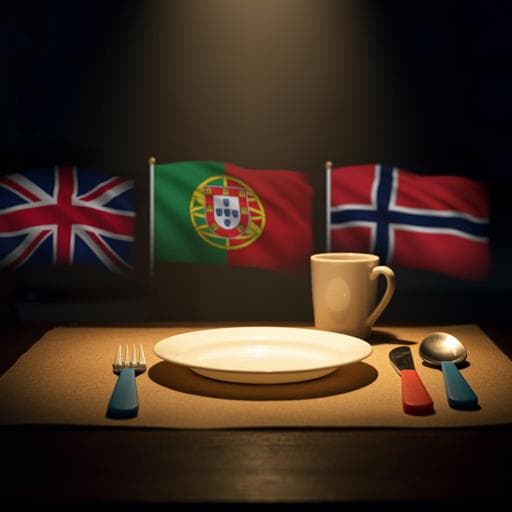
Social Work
Experiences of food poverty among undocumented parents with children in three European countries: a multi-level research strategy
J. Brannen and R. O'connell
The paper addresses how social context influences the resources available to undocumented migrant families and how parents and children manage and experience material deprivation and social exclusion, focusing specifically on food poverty. Undocumented migrants face extreme poverty, are largely invisible in surveys, and are often excluded from welfare and health services, labour markets, and full social assistance. Following the 2008 financial crisis and austerity, hardship increased, and the COVID-19 pandemic further heightened difficulties. The study adopts a realist approach to explore the interplay between societal structures, historical legacies, and agency while considering migrants' interpretations of their experiences. Through a multi-tiered, mixed-methods design, the research examines macro (public policy), meso (local institutions and social networks), and micro (household practices) levels to explain the conditions that make it harder or easier for undocumented parents to sustain and feed their families across different European contexts.
Background literature and context emphasize: (1) the scale and invisibility of undocumented migration in Europe, with estimates ranging from ~1.9–3.8 million (2008) to ~3.9–4.8 million (more recent), and national estimates such as ~674,000 in the UK, tens of thousands in Portugal (notably Brazilians), and ~15,000 in Norway; (2) extensive exclusion from welfare, health services, and formal labour markets, including gatekeeping or 'bordering' practices in healthcare and rules such as the UK's 'no recourse to public funds' (NRPF); (3) reliance on charity and informal 'bricolage' of resources in the absence of entitlements; (4) colonial histories and racism shaping migration regimes and lived experiences, with Black Africans over-represented among undocumented migrants and facing discrimination in citizenship, services, and employment; (5) divergence in national policy contexts: the UK's hostile environment and austerity-driven retrenchment; Portugal's post-colonial ties, informal labour market access, ongoing regularisation, and broader health access; Norway's small undocumented population, strong residency-linked entitlements, and high regulation with limited access for undocumented adults. These literatures frame expectations about differential access to resources and the lived experience of food poverty across contexts.
Design: Mixed-methods, multi-level, comparative case study design (2014–2019), informed by a realist ontological stance. The Families and Food in Hard Times project (ERC grant 337977) examined how low-income families with a child aged 11–15 managed to sustain and feed themselves in the wake of the 2008 financial crisis across the UK, Portugal, and Norway. Levels of analysis: Macro (public policy contexts—immigration law, welfare regimes, labour markets; country discourses on food insecurity), meso (local institutions such as schools and charities; informal networks of family/friends), and micro (household practices, resource management, and experiences of food poverty by parents and children). Data and procedures: Phase 1 involved secondary analysis of international/national datasets, review of country histories and welfare policies relevant to families, food and poverty, and analysis of newspaper reporting (2006–2015) on families, poverty, and food. Phase 2 comprised intensive qualitative research with 133 low-income households (equally distributed across the three countries) with children aged 11–15, recruited from comparable capital-city and less urbanised areas. Methods included semi-structured interviews, questionnaires, and visual methods; children were interviewed separately where possible with informed consent. Samples: Diverse migrant origins. In the UK sample, four of nine mothers from former West African British colonies lacked leave to remain at interview. In Portugal, two parents (from former African colonies) were undocumented. In Norway, one father from the Horn of Africa lacked residency at the time. Given the small number of undocumented cases overall, three illustrative cases (one per country) were selected; matching on family characteristics was not feasible. Ethical approvals were obtained in all participating institutions and informed consent was secured.
- Cross-national policy context (macro) shapes access to income, services, and food, with pronounced differences across the UK, Portugal, and Norway.
UK (Morowa, London):
- Loss of 'limited leave to remain' led to prohibition on work and loss of access to public funds (e.g., Housing Benefit, Child Tax Credit, Child Benefit). Rent rose from £1200 to £1500/month; court and debt collection actions ensued.
- Local Authority Social Services declined Section 17 Children Act support after a 'child in need' assessment; secondary school excluded the teenage sons from free school meals (FSMs). Primary-aged siblings were eligible by law.
- Teenagers experienced hunger at school (fatigue, stomach pain), shame, and social exclusion (unable to join activities; avoided the canteen; concealed hunger). Access to charity food banks was time-limited (three visits). Minimal informal support from an ex-partner and church contact.
- Micro-level coping: monotonous, low-cost diets (rice, cassava, beans), strict avoidance of waste, mother frequently skipped meals and avoided meat to prioritise children.
Portugal (Maria, Lisbon):
- Worked in the informal economy as a cleaner (~€300/month cash) plus occasional odd jobs (€10–€50). Son, born in Portugal, eventually obtained identification at age 14; some state support for children without documents.
- Employment exploitation by a cleaning company (bankruptcy; unresolved court case) compounded instability. Despite lack of residency, Maria noted positive aspects of state support (e.g., schoolbooks from the council).
- Meso supports included Social Services (groceries, nappies, milk; attempts at regularisation), extended family (aunt provided meals, sleepovers, small cash), and charity (daily prepared food via municipal cafeteria). Son received FSMs, free breakfast, and snacks twice daily at school.
- Micro-level coping: ~€50/month food budget; shared kitchen constraints; reliance on staples (rice, pasta), shopping around for offers, batch cooking. Periodic food shortage led to occasional theft. Son downplayed hunger, suggesting stigma.
Norway (Zeinab, Oslo):
- Mother and children had residency; husband (seeking family reunification) was undocumented and ineligible for benefits. Zeinab completed the integration programme; as a mother of a baby she was not employed.
- NAV provided 17,428 NOK/month (including child benefits for three youngest) plus 4,667 NOK towards rent (9,500 NOK/month) and electricity; recent unexplained cuts reduced income.
- Limited informal networks; periodic borrowing for essentials (bread, milk, fruit). Absence of school meals increased costs of packed lunches. Used food bank and charities for clothing/gifts; occasional low-cost treats (McDonald’s at home).
- Micro-level coping: cereals for breakfast and supper; dinners based on rice/spaghetti/potatoes; stretching meat portions; bulk-buying staples; cross-border trips to Sweden to purchase cheaper halal meat for freezing.
Comparative insights:
- UK’s restrictive immigration/NRPF policies and school FSM exclusion for undocumented families precipitated acute hunger and social exclusion even within schools.
- Portugal’s less stringent enforcement and availability of FSMs and municipal/charity food reduced child hunger despite very low incomes and precarious legal status.
- Norway’s generous welfare for resident family members buffered food insecurity, though lack of school meals and benefit cuts strained budgets; undocumented adults remained excluded.
The multi-level comparative design clarifies how macro-level immigration and welfare regimes, meso-level institutions and networks, and micro-level household strategies interact to shape undocumented families’ food experiences. In the UK, punitive immigration controls and NRPF rules cascade through meso-level systems: social services deny Section 17 support and schools exclude undocumented pupils from FSMs, intensifying hunger and stigma among children. In Portugal, the coexistence of informal labour market access, free healthcare entitlements, school-based feeding (FSMs, breakfast, snacks), and municipal/charitable provisioning mitigates child hunger, even as complex regularisation processes sustain legal precarity and low earnings. In Norway, strong residency-linked welfare provisions (cash benefits, scholarships, child benefits) protect children in resident families but leave undocumented adults without support; the lack of school meals shifts costs to households, and benefit fluctuations create instability. Across cases, meso-level supports (schools, councils, charities, informal kin/friend networks) critically mediate access to food, while micro-level adaptations (mothers prioritising children’s intake, stretching meals, bulk-buying, cross-border shopping) reflect constrained agency. The findings underscore that differences in national and local entitlements materially alter children’s and parents’ daily experiences of food poverty and social participation.
This study demonstrates the explanatory value of a realist, multi-level comparative research strategy for understanding how undocumented parents with children navigate food poverty across differing European contexts. By integrating macro policy analysis with meso institutional/network dynamics and micro household practices, the research identifies which contextual configurations exacerbate or alleviate child and family food insecurity. The cases highlight that: (1) restrictive immigration and welfare policies (e.g., UK NRPF, school FSM exclusion) produce acute hunger and social exclusion; (2) school-based feeding and municipal/charity supports (Portugal) can substantially protect children; and (3) generous residency-linked welfare (Norway) buffers families, though gaps remain for undocumented adults and where school meals are absent. The pandemic has intensified existing inequalities, underscoring the need for joined-up policies across national legislation and local service delivery to uphold the right to adequate food for all children regardless of parental legal status. Future research should extend comparative case analyses, incorporate larger samples of undocumented families to examine heterogeneity, and evaluate policy changes (e.g., pandemic-era measures) on household food security.
- The in-depth analysis focuses on three illustrative cases (one per country) drawn from a small number of undocumented participants; matching of family characteristics across cases was not possible.
- Findings are not statistically generalisable; they offer analytic generalisation within a comparative case framework.
- Administrative and benefit details are time- and place-specific; recent policy changes (e.g., pandemic responses) may shift entitlements and experiences.
- Data access note: study datasets are not publicly available at present (UK data in preparation for deposit).
Related Publications
Explore these studies to deepen your understanding of the subject.







